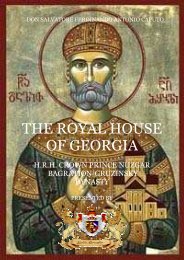here - Nobility Associations
here - Nobility Associations
here - Nobility Associations
You also want an ePaper? Increase the reach of your titles
YUMPU automatically turns print PDFs into web optimized ePapers that Google loves.
addressed to Padovani. It states that all prisoners were immediately sentenced to<br />
death except Corrado de Antioch (Story of the letter reported by Ridola, op. Cit., P.<br />
239 n. 1). Certainly Charles of Anjou, under pressure from the powerful Cardinal<br />
Orsini, the pope and the latter on Charles of Anjou because they utilizes Corrado<br />
for an exchange of hostages, his two prisoners brothers (C. Piccolini, Monticelli in<br />
the thirteenth and fourteenth centuries , in "Proceedings of the Society Tiburtina<br />
and memories of history and art", 8, 1928, p. 257; E. Amadei, op. Cit., p. 1904<br />
Gregoroius F., op. Cit., III, p . 42; V. Pacifici, op. Cit., p. 274), might have led some<br />
of his followers to take revenge on their brothers Orsini. Both the Pope that Charles<br />
of Anjou wanted this absolutely avoided.<br />
Charles d'Anjou "reluctantly" (See P. Ridola, op. Cit., P. 239) could not deny the<br />
favor to the representative of one of the most powerful Guelph families. It suggests<br />
that Charles had kept alive Corrado of Antioch because from his existence<br />
depended on the Orsini. The two Orsini were released and Charles of Anjou, in<br />
turn, handed the pontiff Corrado of Antioch (P. Ridola, ibid.).<br />
The chronicler Saba Malaspina summed up in a few lines the whole affair that<br />
allowed Conrad to save the life after the battle of Tagliacozzo: “Corrado vero de<br />
Antiochia post tempus ad magnam Reverendi Patris S. Cajetani Sancti Nicolai in<br />
carcere Tulliano Diaconi Cardinalis instantiam, vitae benefficium indulgetur, et<br />
pro excambio Domini Neapoleonis, et Domni Matthaei fratrum Cardinalis<br />
praedicti, qui apud castrum Sarrascinesci sub uxoris ejusdem Corradi custodia<br />
tenebantur, a Gallica potestate subducitur, et Ecclessiae donatur” (Saba<br />
Malaspina, Rerum Sicularum, cit., col. 849).<br />
The ceremony of the oath and the release of Corrado of Antioch are referred by a<br />
bull of Pope Martin IV of 1282 published by Raynald (O. Raynal, op. Cit., II, a.,<br />
1282, n. XXVI. The passage of the papal bull is reported by Ridola, op. Cit., p. 247<br />
n. 2). Corrado of Antioch, with this solemn act, not only promised to be faithful to<br />
the Church, but gave himself completely, also on behalf of his son, in the power of<br />
the Pope recognizing him as his sovereign, and in part, of Charles of Anjou.<br />
Another example to show that Conrad was still alive in 1305, in the epitaph on his<br />
son Federico (+22-7-1305) said the "magnificent Domains Conradi de Antioch<br />
Comitis filius Patris et Reverend Bartholomaei .... Frater" if Corrado was already<br />
dead, Federico would have said "..... filius quondam Conradi," as he pointed the<br />
father of Frederick, as his brother were alive.<br />
Corrado of Antioch probably entered the diplomatic game that was<br />
developing between the pope and the Anjou, for which he managed to<br />
keep his feuds, provided to bind to two new "owners", as would<br />
The Hohenstaufen Dynasty - Page 189 of 200



